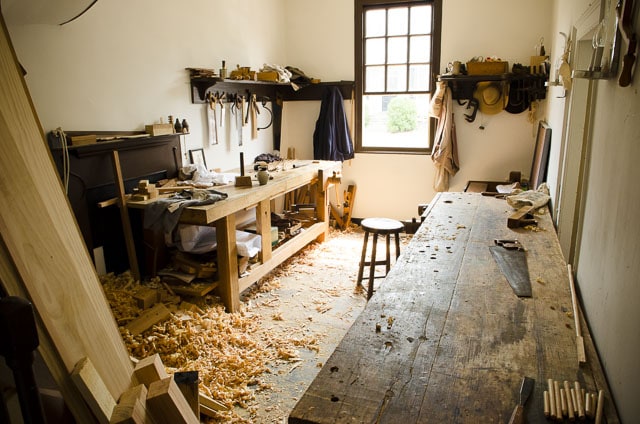
Roy Underhill Tool Tote I've been watching the Woodwrights shop as long as I can remember and have always been a fan. I thought it would be fun to try and make the tool tote Roy carries with him during the start of the show. The Best Roy Underhill Tool Tote Plans To Build Free Download PDF And Video. 16000 Woodworking Plans Get Roy Underhill Tool Tote Plans To Build: Build Anything out of Wood Easily & Quickly. View 13,000 Woodworking Plans here.
Now that I have a shop again, it's time to get back to woodworking. I feel like an athlete who didn't do anything in the off-season and needs to get back in shape, so I wanted to start with an easier project. The perfect one came along in a video by Shannon Rogers of 'The Renaissance Woodworker.' It is a copy of the tool tote that Roy Underhill carries in the introduction to his show (I read elsewhere that there are plans for building it in his book Woodwright's Apprentice.). I can recall seeing my grandfather carry a similar tote when I was a child.
Wooden Tool Tote Plans
The design of this tote is a classic, outstanding in form and function. It's strength is in the center 'I' composed of the ends and the handle/divider, allowing the long sides to be thin and light. The angled sides make it easy and convenient to access tools. I think that, in different sizes, it is ideal for lots of things other than woodworking tools, from gardening tools to knitting.I decided to make a prototype from some alder I have. It is too short to fit full size handsaws, which I see as a requirement for a tool tote, but it will be useful for other purposes. I also decided to angle both sides because I don't like the look of the straight side and don't see how it would make the tote that much easier to carry.
I am embarrassed to admit it, but I could not understand Shannon's explanation of the need for compound angles, a lack of visual/spatial intelligence on my part I am afraid. I decided to go ahead and just make simple angles, see what was wrong when I put it together and hope I'd be able to saw or plane compound angles if necessary. As it turned out, I never did discover a need for them and am puzzled. Shannon's design obviously differs from mine in some way.
Shannon joined the center divider/handle to the end pieces with an angled through mortise, which I am sure is traditional but seems to create a weak point. I decided to use an alternative that has worked well for me in the past. I created a dado for the handle/divider to sit in and fastened it to the ends with dowels. Quick, easy, and strong, this distributes the force generated by carrying the tote among the dowels. The sides sit in rabbets and are also fastened with dowels (I would like to have tried cut nails like Shannon used, but I don't have any). I made the dadoes with a saw, chisel and router plane. I made the rabbets with a saw, chisel, and plow plane. So this is what my end pieces look like:

My center divider is made just like Shannon's, except for the tenon. I drilled out most of the waste for the handle and then used rasps and files to finish it:

Roy Underhill Tool Tote Plans Printable
Notice the blotching. I went to a lot of effort to cut this tree, have it sawed up and then air dry it, only to discover that most of it is like this, apparently from minerals in the soil, so it gets used for a lot of shop projects. I used a scrap piece of baltic birch plywood for the bottom, so expansion isn't an issue. Add the sides and it's done:

I'm pretty happy with how this came out and it was definitely a good project to begin to get in shape with. It's easy to see why woodworkers went to the trouble of creating the angled sides as it makes seeing and accessing tools very convenient. The 'I' is a full 1' thick and the sides are 1/2' thick on this prototype, making for a stout but heavy tote, overkill I think. Shannon's was 3/4' and 3/8' and I think that is better.
I am thinking about buying some dye to see if I could mute this blotching. I tried stain in the past and it didn't work. Milk paint might look good. Ideas welcome.



